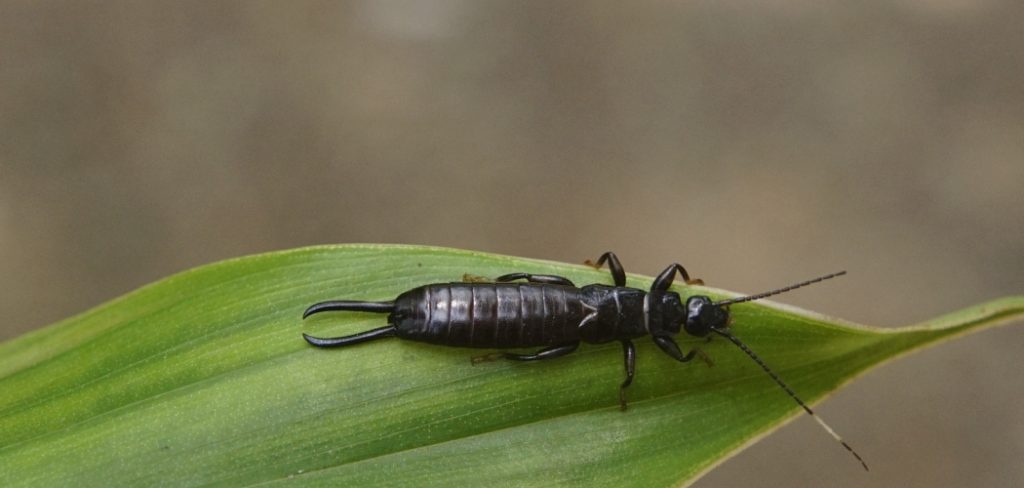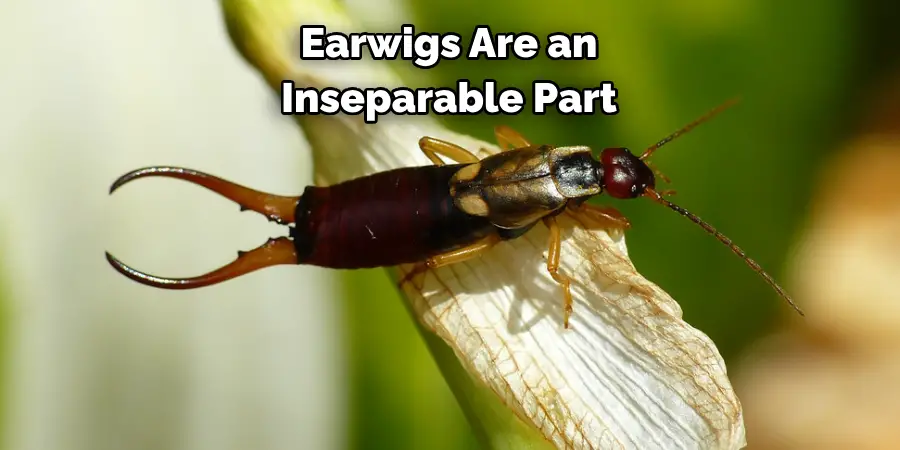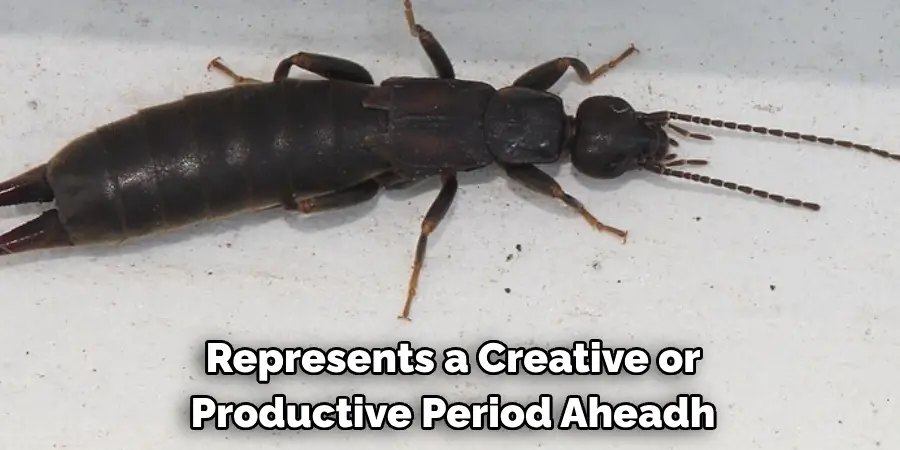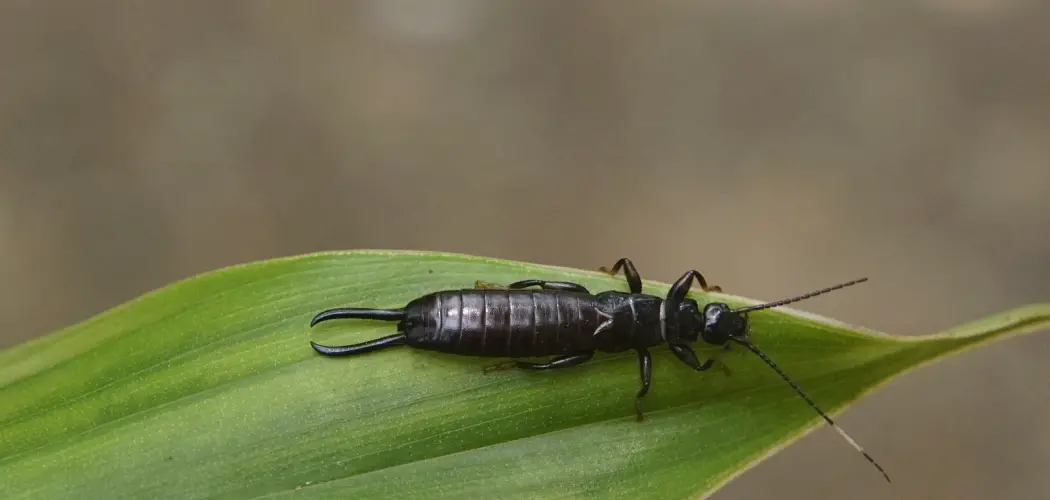Are you curious about the spiritual significance of earwig insects? Our ancestors believed that all animals have a spirit attached to them, so it’s no surprise that this creepy crawly has its own tale. In folklore and mythology, earwigs are often associated with secrets and mysteries – their appearance in our lives can indicate hidden knowledge or an impending great revelation. From superstitions about directionality to dreams revealing deeper truths–this article will explore the earwig spiritual meaning behind these small yet significant critters!

Earwig Symbolism and Meaning
Earwig Native American Symbolism
The earwig insect has been significant in Native American culture for centuries. Depicted in various forms of art and storytelling, the insect is often associated with perseverance and adaptability. The earwig’s ability to navigate through tight spaces and its hard exoskeleton symbolizes strength and tenacity.
In some tribes, the earwig is believed to bring good luck and protect against harmful forces. Its intricate appearance and curious behavior have captivated many Native American tribes, turning the earwig into a respected and revered symbol. Today, the earwig serves as a reminder to persevere in the face of adversity and to always remain flexible in life’s ever-changing landscape.
Earwig Eastern Symbolism
Earwigs are an inseparable part of Eastern symbolism and have been featured in various art forms, including pottery and sculpture. These little insects are believed to represent humility and patience, two highly valued qualities in Eastern philosophy.

According to some beliefs, earwigs were also associated with strength and resilience. It is said that if a person observes an earwig, they can learn important lessons about the power of perseverance and grit. The symbolism of the earwig in Eastern culture is a testament to the depth and richness of the philosophy and beliefs that shape this region of the world.
Earwig Christianity Symbolism
The earwig insect isn’t the most beloved creature in the world, with its pincers and nocturnal habits. However, this intriguing insect has been adapted into Christian symbolism in an interesting way. Known as the “earworm” in Old English, many believed the earwig could crawl into a person’s ear and lay eggs in their brain, leading to madness and death.
But in Christianity, the earwig symbolizes humility and servitude. As a small, often overlooked creature, Christians are reminded to stay humble in their faith and serve others with the same meek spirit of the earwig. It’s a surprising lesson from an unexpected source.
Earwig Celtic Symbolism
Earwig insects might seem like a strange topic to explore regarding Celtic symbolism. However, for the Celts, the earwig holds a special meaning. They believed the earwig was a powerful symbol of strength, perseverance, and resilience. This is because, despite its small size, the earwig is known for its ability to hold on tightly and never give up.
The insect’s name comes from the Old English word for ‘ear creature,’ a nod to its tendency to crawl into people’s ears while they sleep – a not-so-pleasant notion but a testament to the earwig’s tenacity. So, the next time you see an earwig crawling across your garden or hear its name mentioned, remember that this little creature has a rich history and carries a powerful message of unwavering strength and unrelenting perseverance.

Earwig African Symbolism
Earwigs are fascinating insects that are often associated with African symbolism. While they may not be the prettiest creatures to look at, they have been revered for centuries in many African cultures for their resilience and adaptability. In some traditions, the earwig is thought to bring good luck and protection; in others, it is seen as a symbol of hard work and perseverance.
Despite their reputation as pests, earwigs are an important part of many ecosystems, and their unique appearance and behavior make them a fascinating subject for study and exploration. Whether you are interested in insect biology or cultural symbolism, the earwig will pique your curiosity and expand your understanding of the natural world.
Earwig Spiritual Meaning
The earwig insect may not be the most revered creature in the insect kingdom, but it holds a special significance in spiritual belief systems. The spiritual meaning of the earwig is centered around the powerful symbolism of rebirth and new beginnings.
The insect’s scissor-like pincers are seen as a metaphor for cutting away old habits and thought patterns that no longer serve us, allowing us to embrace new growth and transformation. Furthermore, the earwig’s ability to hide and burrow signifies the importance of retreating and reflecting on our spiritual journey. While the earwig may not be the most conventional spiritual symbol, it carries a strong message of hope and renewal.
Earwig in Dreams
Have you ever had a dream about an earwig insect? While dreams involving bugs might make your skin crawl, the earwig holds a unique place in the realm of dream symbols. Some believe that dreaming about earwigs represents a creative or productive period ahead. Others associate them with feeling trapped or stuck in a particular situation.
Regardless of your interpretation, the earwig is an animal with a significant presence in dreams. By understanding the meaning behind its appearance, you may be able to decode the messages your subconscious is trying to communicate. So, next time an earwig shows up in your dream, pay attention and listen closely to what it could be trying to tell you.

Earwig Encounters and Omens
Earwigs have long been the subject of myths and folklore, and for good reason. These strange-looking insects’ intimidating pincers have often been associated with bad luck and ominous warnings.
Some believe that encountering an earwig signifies a watershed moment in one’s life, typically one that is not positive. Others have linked these bugs with superstitions such as death, disease, or other misfortunes. Despite their ominous reputation, earwigs are fascinating creatures that maintain a vital role in the ecosystem. Understanding these insects as part of the natural world can help dispel any negative associations and create a deeper appreciation for their place in the environment.
Earwig’s Meaning in Mythology and Folklore
Earwigs are among the most intriguing insects, with a fascinating history in folklore and mythology. These little creatures have captivated people’s imaginations for centuries and inspired countless tales. In some cultures, earwigs are considered a symbol of good luck; in others, they are seen as harbingers of death or bad omens.
These beliefs have made their way into legends and superstitions worldwide, including Japan, Europe, and North America. Despite their sometimes-negative reputation, earwigs’ unique physical features and nocturnal habits make them a natural fit for many tales of mystery and magic. If you want to add a little intrigue to your storytelling, the earwig is an insect worth considering.
Earwig Totem Animal
The earwig insect may not be the first animal you think of when it comes to totem animals, but it holds a unique place in spiritual significance. Known for their long, slender bodies and distinctive pinchers, earwigs symbolize protection and balance.
They are thought to bring reassurance and a sense of safety during times of chaos and uncertainty. Those who resonate with the earwig as a totem animal often embody its traits of adaptability and resilience. Through the earwig, we can learn to find our footing in the most trying of circumstances and emerge stronger in the end.
Earwig Tattoo Meaning
Earwig insect tattoos may not be the most popular designs, but they hold a distinctive meaning. With their long and spindly pincers, earwigs have a reputation for being creepy crawlies that we’d rather not have around. But in many cultures, these little critters possess a certain symbolism that goes beyond their physical appearance.
In some ancient myths, earwigs were believed to bring good luck and fortune; in others, they were seen as protectors of the home or guardians of the underworld. Whatever the interpretation, earwig tattoos can represent inner strength and protection or simply as a bold and unique design for those who appreciate the quirks of the natural world.
Earwig Spirit Animal
The earwig insect is certainly an eclectic and fascinating creature that has garnered attention from many cultures throughout history. Known for its bizarre appearance, with its pincers protruding from its rear end, the earwig has become quite the celebrity in the world of spirit animals.

Some believe that the earwig’s piercing pincers represent the ability to defend oneself fiercely when threatened. In contrast, others feel that the mystical qualities imbued in the earwig can guide in times of need. Regardless of one’s interpretation of the earwig spirit animal, there’s no denying this peculiar bug stands out in the insect world.
Conclusion
The spiritual significance behind earwigs may be as varied as the creatures themselves. As nature’s living dustpan, they represent a valuable role in the eternal cycle of life and death. Ultimately, their symbolic association comes down to personal interpretations—all of which may draw similar conclusions: honor your environment, respect all lifeforms, practice prudence in decision-making, and trust your instincts.
Take these lessons to heart to incorporate them into your spiritual journey and commit to avoiding repercussions from missteps. We can all learn something from the humble earwig about how to live more mindful lives. So go forth and take a newfound appreciation for this diminutive invertebrate—for it may hold much wisdom if we see it with new eyes. Thanks for reading our post about the earwig spiritual meaning.
You Can Check it Out Dobsonfly Spiritual Meaning, Symbolism and Totem

